Anyone that has been paying any attention to the news lately can’t miss the scary fact that new mothers in our country are dying in the first year of motherhood at an alarming rate.
What is happening?
This is a question that has been on the minds of lawmakers, medical professionals, and the families who are losing them. A quick Google search yields a startling reality: that in this land of excess and opportunity we are doing a piss-poor job of caring for our new mothers, especially WOC mothers. This startling reality has only gotten worse due to COVID-19.
The WHY
I don’t know if I know the answer to this question. But I have a theory and it is one based in personal experience (and professional training). With the birth of my first child, I suffered from one of the most common and deadly complications of childbirth: Postpartum Depression. I fell through the cracks.
Falling through the cracks
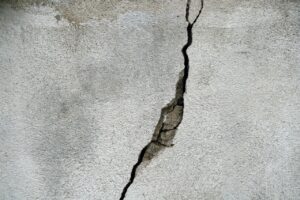 This is what is happening with new mothers. They are falling through the cracks. Cracks in the healthcare system, cracks in the postpartum care system, and cracks in our public consciousness.
This is what is happening with new mothers. They are falling through the cracks. Cracks in the healthcare system, cracks in the postpartum care system, and cracks in our public consciousness.
Wicked Privilege
Being a middle-class white cisgender woman, I was at a fairly low risk for falling through the cracks, yet I did. I was surrounded by mental health professionals (work and grad school), suffering terribly, and no one noticed. My husband was just as shell-shocked as me. He was in no position to know what to was normal and what was not.
Here’s what happened in a nutshell:
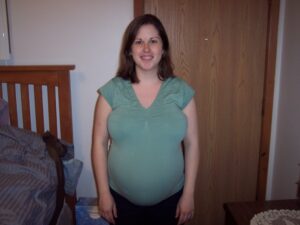
I was at risk for developing it because of undiagnosed/untreated prenatal anxiety. No doctor talked to me about anxiety and depression during pregnancy. I had no idea that I had it or that I was at risk for developing PPD.
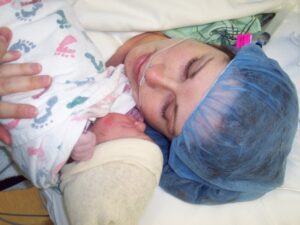 I had a very good and easy pregnancy and went into spontaneous labor at 41 weeks. (FYI this is NORMAL, especially for first time moms). My labor did not go according to textbooks (also NORMAL) so I was encouraged to believe I couldn’t give birth. Despite my terror and devastation, I consented to a cesarean (read more of his story here).
I had a very good and easy pregnancy and went into spontaneous labor at 41 weeks. (FYI this is NORMAL, especially for first time moms). My labor did not go according to textbooks (also NORMAL) so I was encouraged to believe I couldn’t give birth. Despite my terror and devastation, I consented to a cesarean (read more of his story here).
To make matters worse
After discharging home, I also encountered many problems with breastfeeding my newborn which further raised my risk of developing a perinatal mental health disorder. Thrush, mastitis, slow weight gain, cracked and bleeding nipples, you name it, I dealt with it.
The darkest hole
A few weeks later I was in the depths of the darkest hole I had ever known in my life. I went through great lengths to avoid reminders of the birth and despite my efforts, flashbacks plagued me (What is birth trauma?). This was an awful time in my life. I was afraid to admit to anyone how I felt, even when I considered that the world and my son might be better off without me. I never made a plan for suicide but the ideas were there.
You have a healthy baby
No one asked me how I was handling the transition to motherhood or if I was struggling. Mostly people just wanted to tell me that I shouldn’t be so upset about how he was born, get over it. This was not helpful at all. It very easily could have been devastating, thankfully my husband was my rock.
Getting better
I worked through all of this on my own, I never sought professional help. I truly believed that everything that I was going through was due to my failure to give birth properly and my devastation about how my son was born. An online support group in the form of International Cesarean Awareness Network (ICAN) became my lifeline.
The women of ICAN helped me immensely. Although none of them knew that I was suffering from PTSD and PPD (no one can really tell that from online posts), they were supportive and listening “ears” and it helped me so much.
Other countries do better
In nearly every other developed nation around the world, the period of postpartum is treated as a special time in a woman’s life: rituals abound from everything including special meals, special ceremonies, to a special term to even refer to this period of time. Mothers are viewed as vulnerable, and open to risks such as infection, colds, and other ailments. (Postpartum around the world)
Now, not all of this is medically sound or scientifically supported, even some practices are deemed unsafe by our medical standards. But you can’t argue with results. The women in these cultures are so well cared for and watched so closely by loved ones and trained caregivers, that any problems that arise are quickly addressed.
Life-long impacts
This experience has had long-lasting impacts in my life, some good and some not so good. How did this happen to me? First, I had limited postpartum support. This doesn’t mean that people in my life weren’t supportive, they were. My husband was a new father himself, so he didn’t know that we shouldn’t be struggling like we were.
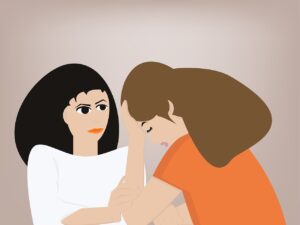 Logistical help in the form of meals and laundry and baby care help from close family was provided. But what I needed was someone who knew the questions to ask and knew what was normal and what was outside normal. I needed a postpartum doula.
Logistical help in the form of meals and laundry and baby care help from close family was provided. But what I needed was someone who knew the questions to ask and knew what was normal and what was outside normal. I needed a postpartum doula.
Local solutions
Many people in this community do not know of postpartum doulas or they think they are only for for women suffering from postpartum depression or families who are very wealthy. While it is true that postpartum doulas do serve families that fit those descriptions, they are not only for them.
If I had a professionally trained doula caring for me after my son’s birth, it is likely she would have helped me catch the breastfeeding issues before they got out of control, it is also likely she would have known the questions to ask me to help me recognize the depression and PTSD that I was suffering from and helped me to locate a supportive therapist.
Trained postpartum doulas are available and working in and around Omaha, NE. Some of us have personal experience with suffering in the postpartum period. We were called by our experiences to find a way to help others avoid what we went through.
Not everyone can afford to hire one of us (and we can’t work for free) so this isn’t a perfect system. My dream is to eventually have grant funding so that all families can have the support of a professionally trained doula. And this year I began working with a non-profit, Omaha Better Birth Project so that dream may become a reality some day soon!
How to help
If you or someone you care about is expecting a child, skip the baby shower and pool money together for postpartum doula care. Many new parents receive or buy many baby products that are quite expensive. Then they barely use these items.
But if you can’t or don’t want to do this, then at the very least talk to the new parents in your life. Don’t focus on the baby, ask them how they are doing. A good question is: Becoming a parent is a huge transformation, how is it going for you?
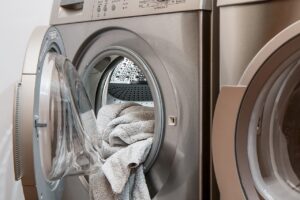 Then be prepared to ask follow-up questions and listen. And while you’re there, take out the trash or throw a load of laundry in the wash.
Then be prepared to ask follow-up questions and listen. And while you’re there, take out the trash or throw a load of laundry in the wash.
